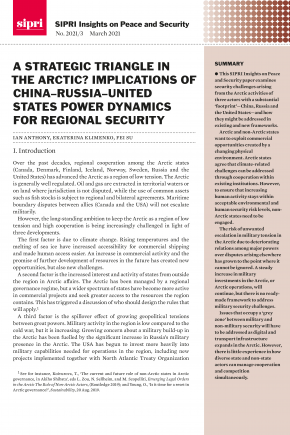A Strategic Triangle in the Arctic? Implications of China–Russia–United States Power Dynamics for Regional Security
This SIPRI Insights on Peace and Security paper examines security challenges arising from the Arctic activities of three actors with a substantial ‘footprint’—China, Russia and the United States—and how they might be addressed in existing and new frameworks.
Arctic and non-Arctic states want to exploit commercial opportunities created by a changing physical environment. Arctic states agree that climate-related challenges can be addressed through cooperation within existing institutions. However, to ensure that increasing human activity stays within acceptable environmental and human security risk levels, non-Arctic states need to be engaged.
The risk of unwanted escalation in military tension in the Arctic due to deteriorating relations among major powers over disputes arising elsewhere has grown to the point where it cannot be ignored. A steady increase in military investments in the Arctic, or Arctic operations, will continue, but there is no ready-made framework to address military security challenges.
Issues that occupy a ‘grey zone’ between military and non-military security will have to be addressed as digital and transport infrastructure expand in the Arctic. However, there is little experience in how diverse state and non-state actors can manage cooperation and competition simultaneously.
I. Introduction
II. The evolution of Arctic and non-Arctic states’ interests and policies in the region
III. Geopolitical tensions: Impact on maritime transportation and energy resource exploration in the Arctic
IV. Military security developments and challenges in the Arctic
V. Containing military security risks for the Arctic region
VI. Conclusions and recommendations


